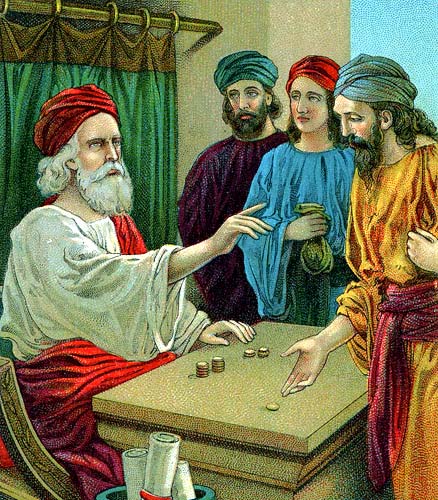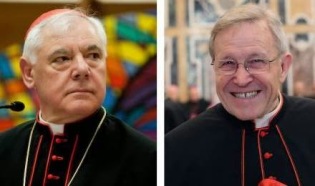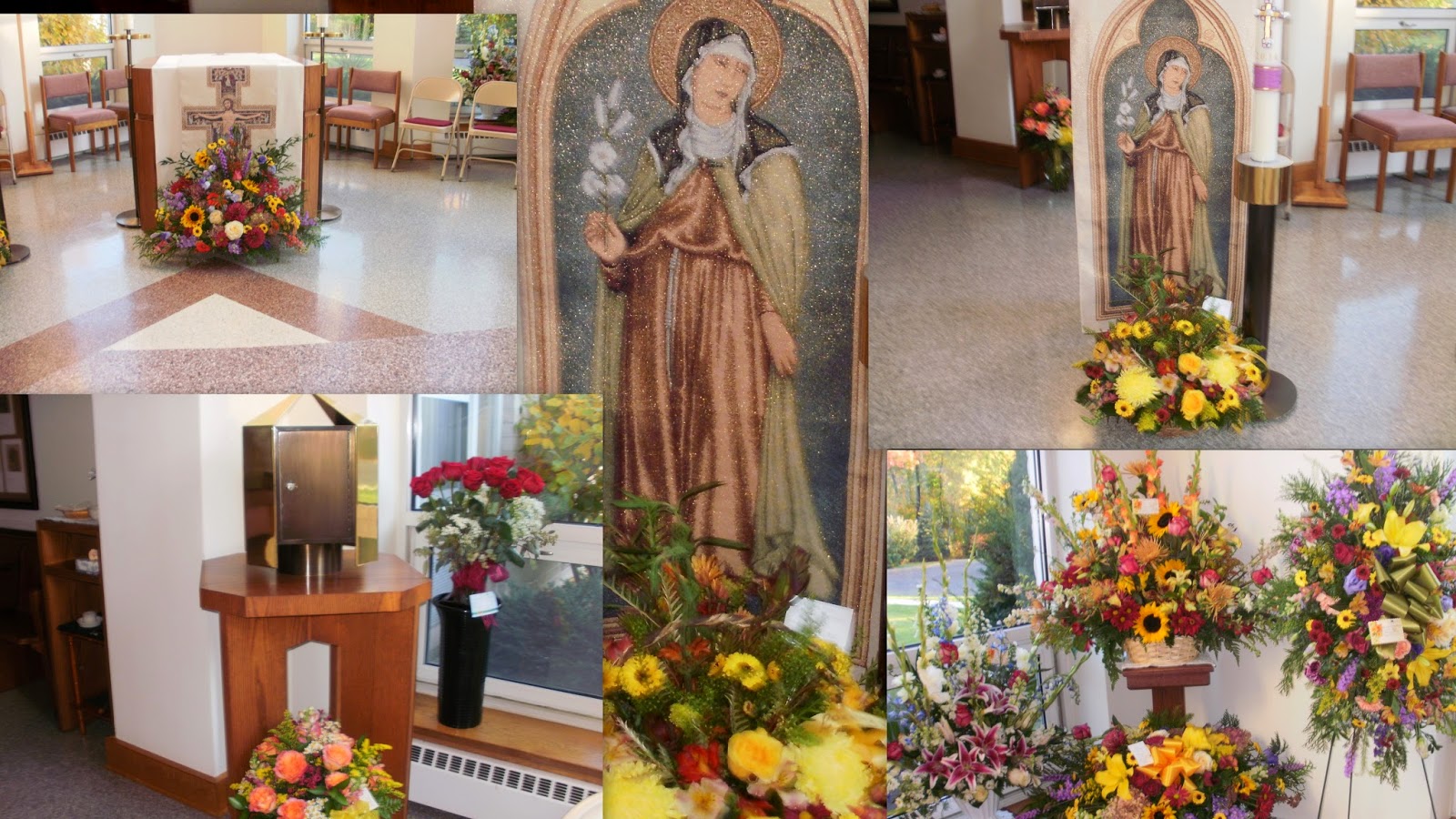
November 17 FEAST OF ST. ELIZABETH OF HUNGARY [1207-1231], QUEEN AND SECULAR FRANCISCAN
November 17, 2014 by

A biblical reflection on the 33rd ORDINARY SUNDAY, 16 November 2014)
November 16, 2014 by
WE CANNOT TAKE GOD’S GIFTS AND USE THEM ONLY FOR OUR PLEASURE
(A biblical reflection on the 33rd ORDINARY SUNDAY, 16 November 2014)
Gospel Reading: Matthew 25:14-30
First Reading: Proverbs 31:10-13,19-20,30-31; Psalms: Psalm 128:1-5; Second Reading: 1Thessalonians 5:1-6
“For is will be as when a man going on a journey called his servants and entrusted to them his property; to one he gave five talents, to another two, to another one, to each according to his ability. Then he went away. He who had received the five talents went at once and traded with them; and he made five talents more. So also, he who had the two talent made two talents more. But he who had received the one talent went and dug in the ground and hid his master’s money. Now after a long time the master of those servants came and settled accounts with them. And he who had received the five talents came forward, bringing five talents more, saying, ‘Master, you delivered to me five talents; here I have made five talents more.’ His master said to him, ‘Well done, good and faithful servant; you have been faithful over a little, I will set you over much; enter into the joy of your master.’ And he also who had the two talents came forward, saying, ‘Master, you delivered to me two talents; here I have made two talents more.’ His master said to him, ‘Well done, good and faithful servant; you have been faithful over a little, I will set you over much; enter into the joy of your master.’ He also who had received the one talent came forward, saying, ‘Master, I knew you to be a hard man, reaping where you did not sow, and gathering where you did not winnow; so I was afraid, and I went and hid your talent in the ground. Here you have what is yours.’ But his master answered him, ‘You wicked and slothful servant! You knew that I reap where I have not sowed, and gather where I have not winnowed? Then you ought to have invested my money with the bankers, and at my coming I should have received what was my own with interest. So take the talent from him, and give it to him who has the ten talents. For to every one who has will more be given, and he will have abundance; but from him who has not, even what he has will be taken away. And cast the worthless servant into the outer darkness; there men will weep and gnash their teeth.’ (Matthew 25:14-30 RSV).
In the parable of the talents (silver pieces), Jesus warns us that we must of our own will use the gifts of God wisely, if we are to enter the Kingdom of Heaven. In this parable, as in so many others, He insists that is God’s property we are using, and it remains God’s property. He has given a variety of talents and the good things of life to His creatures, things of greater and lesser values, to greater and lesser degrees. This the parable expresses in terms of money, over which each servant is merely the administrator. The Master strictly charges them to use his goods wisely and bear abundant fruit.
When their time is up and the Master returns, he demands an account from each. Those who have allowed God’s work to be done through them are rewarded. They shall be judges and leaders in God’s Kingdom. “Well done!” he says, “Since you were reliable in a small matter, I will put you in charge of greater affairs. Come, share your Master’s joy.”
It is a strong reminder that we cannot take God’s gifts and use them only for our pleasure. The good things of life are not merely our own, to do with as we please. They must be used well in the service of God and our neighbor. This is another parable in which Jesus warns us about the abuse of riches. Unless we develop a deep charity, a spirit of sharing, a generosity with what God has given us, we shall meet the fate of the foolish man who put his silver pieces or talents in the ground, and did not use them for the glory of God.
Only those who make a lot of room for God and their neighbor, using the good things God has given, only these will be worthy of any reward.
Short Prayer: Lord Jesus, thank You for all the gifts You have given me. Help me to be aware of these gifts, that I may surrender them to You and use them cheerfully and generously to build up Your Kingdom. Amen.
Jakarta, 14 November 2014
A Christian Pilgrim
Night Prayer
November 15, 2014 by

Keep watch,dear Lord,with those who work, or watch, or weep this night, and give your angels charge over those who sleep. Tend the sick, Lord Christ; give rest to the weary, bless the dying, soothe the suffering, pity the afflicted, shield the joyous;
and all for your love’s sake.
Amen
By Friar Casey – Cardinal Differences
November 13, 2014 by
New post on Breaking In The Habit |
|
Wednesday November 12 -And One Leper returned to give thanks. Today’s Gospel Reading
November 12, 2014 by
Let us pray for all our Veterans, living and deceased. Thank you for your service to us and for us.
November 11, 2014 by
Veterans’ service honored with parades, concerts — and prayerby Julie Asher |

(CNS photo/Gregory L. Tracy, The Pilot)
Today, on Veterans’ Day, our nation’s 19.6 million veterans will be honored with numerous concerts, including one in Washington this evening, as well as many parades and picnics. Archbishop Timothy P. Broglio of the U.S. Archdiocese for the Military Services suggests one more way to honor these men and women for their service: With prayer.
“Veterans Day invites us to pause for a moment and reflect on the lives of men and women who respond and responded to the needs of our nation,” he said in a statement. “As it is November, a month dedicated to prayers for the dead, we remember many members of the Armed Forces who made the ultimate sacrifice or who died of natural causes later in life.
“However, we cannot forget those who continue to suffer the effects of their wounds either in mind or in body. They carry the reminders of their commitment and their past with them always. We pray for them, too, and we ask the Lord to give them consolation and healing,” he said.
“The occasion is also propitious to remember the families who mourn the loss of a loved one or who support a disabled Veteran. We pray and offer them our support.”
Last Wednesday, the headquarters of the U.S. military archdiocese in Washington was officially named the “Edwin Cardinal O’Brien Pastoral Center.”
Cardinal Edwin F. O’Brien, a former archbishop of Baltimore who is grand master of the Equestrian Order of the Holy Sepulchre of Jerusalem, was the U.S. military archbishop from 1997 to 2007. Archbishop Broglio, his successor, and the cardinal led a brief service and the unveiling of a sign bearing his name over the front door of the pastoral center. The brief service was attended by dozens of archdiocesan clergy, staff and supporters.
Then-Archbishop O’Brien headed the military archdiocese in 2005 when it acquired what was a seminary owned and operated by the Society of the Divine Word. He oversaw a major, two-year renovation of the five-story building — with a loan from the Knights of Columbus. In 2007, with completely refurbished office space, the archdiocese moved in and for the first time could consolidate all of its operations in one location. The chapel has been outfitted with pews, an altar, tabernacle and other elements re-purposed from closed churches in Cleveland. A special room has been set aside to honor Father Vincent Capodanno, known as the “Grunt Padre.” He died in Vietnam Sept. 4, 1967.
Father Capodanno, a Maryknoll priest and Navy chaplain, died in Operation Swift in the Thang Binh district of the Que Son Valley. He went among the wounded and dying, giving last rites. Wounded in the face and hand, he went to help a wounded corpsman only yards from an enemy machine gun and was killed. He is considered “one of the great military chaplains.
His canonization cause was officially opened in 2002. In 2004, the initial documentation for the cause was submitted to the Vatican’s Congregation for Saints’ Causes. In 2006, Father Capodanno, a native of Staten Island, N.Y., was declared a “servant of God.”

Cardinal Edwin F. O’Brien blesses headquarters of U.S. military archdiocese in Washington. (CNS photo/Julie Asher)
Cardinal O’Brien, in remarks Nov. 5, said the headquarters of the military archdiocese “gives us a solid and permanent identity as a church of Christ in the Catholic tradition. It’s an announcement to all who would pass by — the message that I always tried, and I think all our chaplains do — is to convey, especially to our young people: there’s no contrast between a person of faith and a member of the military. There’s no opposition.
“I always use the brief story of the good Samaritan going down the road and came upon a man who was half-dead, and he took care of him, put him on his donkey, brought him to a hotel, and so forth,” the cardinal continued. “But two others had passed by before that. And they did nothing. My thought was ‘what if this good Samaritan was coming by and the man was being pelted half to death?’ Did he have a right to step back and say, ‘I’ll become a good Samaritan in about 10 minutes when the fight is over?’ Or did he have a right and an obligation to step in and do what had to be done, and only what had to be done, to put an end to that aggression? “
He concluded: “To be a member of the military is to have the potential of a wonderful vocation. One enters a service. Christ defined himself as one who came to serve, and not to be served.”
Sister Claire Andre’s Funeral Mass, November 7, 2014
November 8, 2014 by
Sister Claire Andre’s Funeral Mass was November 7th, 2014.
Sister Claire died November 4th.
Claire did all her programs for her Wake Service
And Eucharistic Mass back in April, 2014.
At the Wake service Claire had asked Friar Jim Moore OFM Conventual to share his memories of her and then she asked him to open it up to the people attending and several did share their memories of her.
Sister Claire had asked Friar Justin Biase OFM Conventual
to be main celebrant,
Friar Andre Cirino OFM, homilist,
Friar Andre Cirino OFM, homilist,
1st Reading , Friar David Moczulski OFM,
2nd Reading Claire’s niece, Loren Rossi,
Gospel ,Friar Russell Governale OFM Conventual
and Sister Frances Vass to read the Communion Meditation.
John Gagliardi , Claire’s youngest brother, gave the eulogy.
2nd Reading Claire’s niece, Loren Rossi,
Gospel ,Friar Russell Governale OFM Conventual
and Sister Frances Vass to read the Communion Meditation.
John Gagliardi , Claire’s youngest brother, gave the eulogy.
May God alone be given glory and praise.





